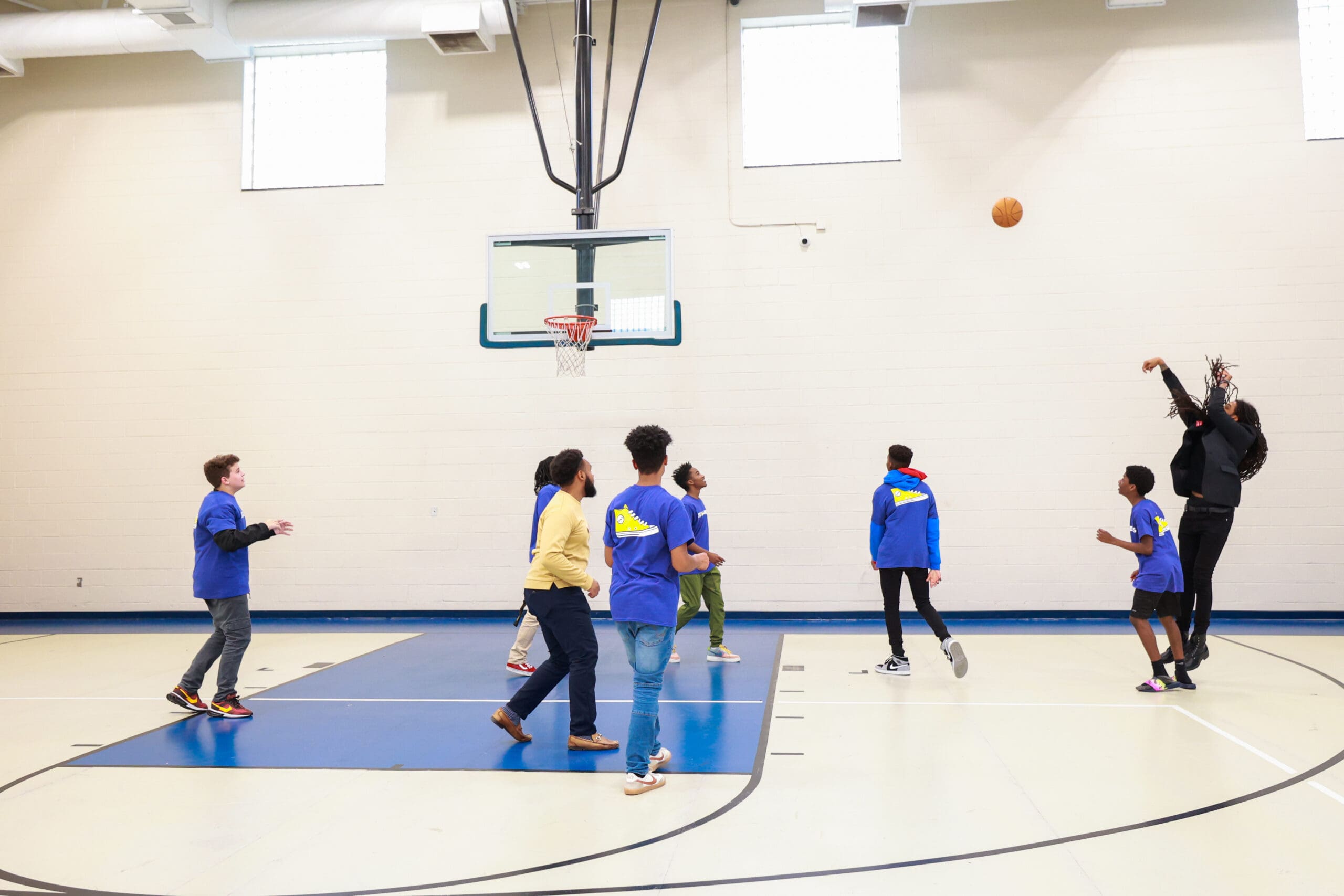SUCCESSFUL COMMUNICATION AT HOME WITH YOUR HIGHSCHOOLER: encourage them to try difficult things
SUCCESSFUL COMMUNICATION AT HOME WITH YOUR HIGHSCHOOLER: encourage them to try difficult things

This is an experience many of us can relate to. Whether applying to our first-choice university, heading into the interview of our dream job, or walking into a fitness class with zero experience; we all have moments when we find ourselves at half-court trying to make the game-winning shot (for all you non-basketball fans, that’s a pretty tough situation to be in).
In those moments it seems as though you have three possible outcomes: take the shot and win, take the shot and miss, or don’t take the shot. Right? WRONG. Take that last outcome and erase it from your memory. Remove it from your vocabulary. Block it from your Facebook. Because in this world, when faced when daunting tasks that stand in between you and your goals, giving up or anything of the sort is just not an option.
But that’s easier said than done, sure. And as the amazing team at NSTS knows very well, communicating that to adolescents is a whole different ball game.
Honest communication is key in building a relationship with your teen
That first word is crucial because anyone who has worked with young people knows they can suss out phony adults quicker than the coming-and-going of TikTok trends (which is so fast, it may compete with the speed of light).
Yes, teens need to you to be honest with them. This is far more important than saying what they seem like they want to hear; it’s saying what they need to hear.
Youth spend tons of time communicating with their peers. Chances are the person you see your teen talk the most with is one of their closest friends. Open and honest communication gives them a chance to be heard, validated, and recognize connections through listening to shared experiences. While parents and family members may be older, and way less “cool” than their BFFs, those same three aspects are important for communication with your high schooler.
Often, when youth are upset with a conversation they have with a family member, they feel ignored, invalidated, and/or that there isn’t a common bond between them and the other person.
Be sure to make time for your young person. Listen to them. Emphasize that what they have to say matters and that their viewpoint (even if you disagree with it) is seen. You can still disagree with someone and say “I see where you are coming from” at the same time. Allow for honest conversation and show that you both hold common ground, especially when it comes to wanting the best for the youth’s future.
Why it’s important to encourage youth to try difficult things
A while back, the Executive Director of NSTS, Monique Turner-Lopez, sent NSTS staff a video from head coach of the Duke Blue Devils women’s basketball team, Kara Lawson. In the video, she talks about the common action of waiting for things to get easier when nothing ever really gets easier. As Lawson states, we need to “handle hard better” rather than wait for things to get easy.
Lawson’s message is one that all young people need to hear. We need to let young people know that those that wait for things to get easier are often discouraged when faced with the reality of how hard meaningful goals can be. Then, that lack of motivation often leads to avoidance—just not taking on the challenge.
Yet, no truly valuable purpose or goal is without challenge. Indeed, if you find that your goals are without challenges, you may not be reaching high enough.
This is what happens to young people that avoid difficulty. They begin to minimize their future options to only what is easy, straightforward, or full of tasks that they have already mastered. Thus, they never even scratch the surface of what they really can do.
Who knows how many scientific discoveries, artistic masterpieces, or innovative inventions never came to fruition because a young person didn’t challenge themselves.
Handling difficulty well also improves one’s resilience and grit. Youth that are encouraged to tackle difficult tasks won’t give up as easily, thus becoming more resilient. Your high schooler will then be able to persevere through the many challenges that life throws at them.
How to encourage youth to try difficult things
The Hard Thing Rule: Psychologist Angela Duckworth shared tips that she uses when raising her own children in her book Grit: The Power of Passion and Perseverance. One of her household principles, the “Hard Thing Rule,” is a great way to encourage your high schooler to try difficult things while building their resilience and grit at the same time. The Hard Thing Rule entails asking your youth to take on something that requires daily, deliberate practice. Everyone in the family picks their own hard thing, which helps ensure they are interested in the tasks. Another part of the rule is that you can’t quit in the middle of something. Communicate to your high schooler the importance of finishing what they start. They can quit eventually, but not until the season is up, renewal fee is required, or another natural stopping point. This prevents them from quitting on a bad day in a moment of frustration or difficulty. (Bonus points if you add in her coinciding rule, the “Fun Thing Rule” because ultimately, all youth should seek a calling that is both hard and fun).
Show Enthusiasm: Youth will be resistant to something even more if they sense that the adults around them do not like it. If you dread getting up in the morning and starting your day, chances are your high schooler follows suit. If you disregard the importance of education or reading, then you may be disappointed when you find their grades are lacking. Conversely, the more we show enthusiasm for things, the more we can encourage intrinsic motivation in them.
Try saying things like:
- “Wow, I can see that this part was difficult for you and I’m impressed that you kept working at it!”
- “This seems like a challenge, I’m really excited to see how you keep at it and try new things to find a solution.”
- “You’re so resilient. I’m proud that you persevered through something so difficult.”
- Discuss your own process facing difficult tasks. “I had a hard time doing _____ today, and once I accomplished it, I felt so proud of myself and relieved. What’s something difficult that you did recently?”
Don’t Rush to Solve their Problems: This is typically more difficult for people raising little ones, but sometimes the temptation is there for older youth as well. Ultimately, youth should know that, while their loved ones will always be on their team, they can’t always be in the front lines. This means they must practice overcoming obstacles rather than having the obstacles removed by another person. Giving them a frictionless path does not result in building character skills like grit or their social and emotional development.
Try saying things like:
- “If you really want something, it’s important to keep at it yourself. Someone else’s best is not always your best.”
- “You might be able to find a solution that’s more creative than mine would be.”
- Give them guides or general hints instead. Ones that still require them to put in effort. “It looks like this math problem is giving you a hard time, try looking at this page of notes to help you figure out how to do it.” “You might find this chapter to be helpful when writing your essay.”
Emphasize the Process More Than the Result: Part of what makes trying difficult things so daunting is that we dwell too much on the outcome. What if we fail? What we truly need to focus on, however, is the process. The skills that make us successful people come with the attempts, trials, and tribulations; not with the end results. Help youth shift their focus away from the fear of failure by diverting it to the lessons they are learning along the way. This is especially important when faced with mistakes or setbacks. Youth should be encouraged to reflect on mistakes as teaching tools rather than put down. When we reward their efforts and positively reinforce the hard work along the way, then we can limit the chances that they will seek the easy way out in the future.
Try saying things like:
- “It’s about practice (or progress), not perfection.”
- “It’s ok if you face mistakes or setbacks. It’s possible to be smart, successful, and still experience moments of failure.”
- “The more you practice this, the better you will be. Almost everything that you can do well now, was unfamiliar to you at some point in time.”
- “No matter what, I am proud of how hard you are working to get this done.”
Break Big Tasks into More Manageable Steps: Sometimes the size of the ordeal is part of what turns youth away from difficult things. This may be how long the process is, or how many steps are included. When communicating with your high schooler, try to guide them through their to-do list and then focus on one manageable step at a time. Almost every goal can be broken down into steps of about 25 minutes of work. If they are intimidated by an essay, have them just focus on researching first. Then only on making an outline of the essay. Then have them take the essay one piece at a time rather than write the whole thing in one sitting. If they are nervous about applying to a university, job, or scholarship; then have them put effort into one step at a time. That could be asking for letters of recommendation, filling out the easier demographic information, or listing possible essay topics. Accomplishing these smaller steps along the way can help motivate and energize the youth as they continue towards their goal.

Take the shot
No one knows just how far the next generation can go if they are given the tools and support to tackle new heights. Your high schooler can accomplish any of the biggest dreams they have if they are willing to conquer the difficult steps along the way. There is immense value in encouraging your youth to try difficult things, especially when they coincide with the youth’s ultimate goals. This promotes resilience and furthers their ability to handle even harder tasks in the future.
This can come into play in their extracurricular hobbies or interests as well as their academic growth.
Next Step To Success encourages young people to try difficult things in many ways. Field trips that expose youth to unfamiliar skills like rock climbing present youth with physical and metaphorical proof that they can reach the goals they aspire to. Individualized coaching towards goals that youth have in and out of the classroom prepares them to for troubles in the road ahead and encourages them to always do their best. This work doesn’t stop at summer camps or after-school programming and anyone that has raised on adolescent knows the work must continue at home. Communicating these principles to your youth at home gives them the tools they will need to face obstacles in the future. So that, one day, when faced with a looming task with little chance it will be the outcome they expect, they feel confident to just take the shot.
If you liked this blog, check out our blog titled, “Successful communication at home with your highschooler: failing grades” or read even more posts under the “News” tab of our website.

© Next Step To Success. All Rights Reserved. Sitemap | Privacy Policy